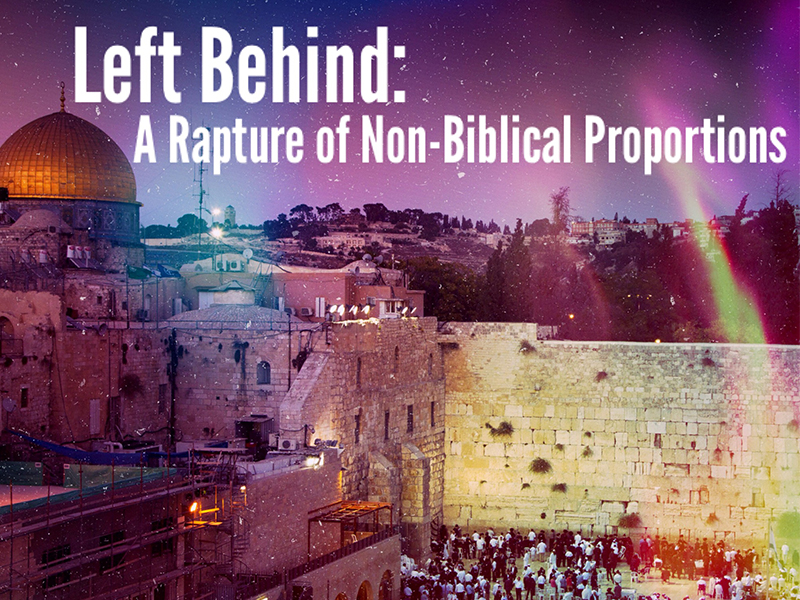Left Behind: A Rapture of Non-Biblical Proportions – Part 1

Matthew 24: 36-41
In Matthew 24:40-41 Jesus says, “Two men will be in the field; one will be taken and the other left. Two women will be grinding with a hand mill; one will be taken and the other left.”
Now, many of you are thinking this seems like a pretty legitimate verse for this theory, especially if you grew up with Left Behind/PMD like I did. But let’s do some simple exegesis to put this verse in its context.
“Matthew 24:36-40, “But about that day or hour no one knows, not even the angels in heaven, nor the Son, but only the Father. As it was in the (I want you to catch this) days of Noah, so it will be at the coming of the Son of Man. For in the days before the flood, people were eating and drinking, marrying and giving in marriage, up to the day Noah entered the ark (On earth); and they knew nothing about what would happen until the flood came and took them all away.”
Who were the ones who were taken in the Noah story? Was it Noah and the righteous? Or was it the unrighteous? If the rapture is true, you DO NOT want to be taken. You WANT to be left. Why? Because if/when the unrighteous are taken, that means Jesus is coming to reign and you want to be left with Jesus, not the unrighteous. Still don’t believe me? Let’s look at another verse, this one from Paul.
1 Thessalonians 4: 13-17
Before I dissect this verse, I want to bring up a major doctrine within the early church that seems to be forgotten: The Resurrection. Most of the following scripture verses are about the resurrection. Think about how central this doctrine was to the early church? The resurrection of Jesus was a foretaste of what will happen to us. Paul spent countless chapters on what will happen when we are resurrected. This was a major theme that totally gets lost and forgotten within PMD.
So in this passage we find Paul discussing those who have fallen asleep (For my article on Reconsidering the Intermediate State, click here) and those who will rise with Christ. He’s discussing what he believes will happen when Jesus comes back for the resurrection. And then he says,
“After that, we who are still alive and are left will be caught up together with them in the clouds to meet the Lord in the air. And so we will be with the Lord forever.”
So why would Paul discuss the resurrection and then discuss the rapture? Well because Paul didn’t believe in a rapture. Paul is known for using analogies and metaphors to explain how things will take place. This is no different. Let’s take this ancient culture in its context. What happens when a King or important person comes to a city? First, people are watching and waiting for him. Second, when he is found in the distance, people run out to greet him. It would be inconsiderate and rude to wait for that person to come into the city without a formal welcome outside the city. Here, Paul is analogically saying that when Jesus returns, we will go to meet Him before he begins His reign on earth. Now maybe we do “meet him in the clouds.” Maybe the Lord will allow us to do so (Which would be pretty sweet if you ask me. I’ve always wanted to fly!)? But this has nothing to do with any kind of rapture theory. It has to do with resurrection and the Lord’s return. Which brings me to a quick important point.
Jesus Returns Again?
PMD suggests that the rapture and the reign of Christ for 1,000 years are both the return of Christ. So does Jesus come back three times? According to PMD he would. He would come back to take his people away. Then he would come back to reign. The problem here is that no biblical document exists that would suggest such a thing. The apostles were told in Acts 1:11, “This same Jesus, who has been taken from you into heaven, will come back in the same way you have seen him go into heaven.” Why wouldn’t they say, “This Jesus will come back for his people and then return once more to reign on earth.” Once again, no biblical support to back up this theory.
1 Corinthians 15
The first third of this chapter discusses Christ’s resurrection (vv. 1-11). The second third discusses the resurrection of the dead (vv.12-34). The last third discusses what the resurrection body will look like and how it will happen (vv.35-58). Once again, this passage is tailored to specifically deal with the resurrection, not a rapture.
According to PMD, verse 51 claims to support a rapture in the way in which we will be taken away from this earth “a flash, a twinkling of an eye.” No. This is how our bodies will be transformed at the time of the resurrection. Why would Paul, who just spent a whole chapter on the resurrection, insert a random verse about the rapture (that is obviously foreign to his eschatology to begin with) right here? He hasn’t even finished talking about the resurrection! He even goes on to say an important creed in the early church, “Where, O death, is your victory? Where, O death, is your sting?” This isn’t about the rapture, it’s about the resurrection!
As you can tell, sometimes I get very frustrated with Christians who want to emphasize a doctrine that is completely foreign to Paul and God incarnate Himself, over a very biblical and central theme in both Jesus and the early church: the resurrection. It is in this very chapter of 1 Corinthians 15:13-14 where Paul says, “If there is no resurrection of the dead, then not even Christ has been raised…our preaching is useless and so is your faith.”
Revelation 4:1b
“And the voice I had first heard speaking to me like a trumpet said, “Come up here, and I will show you what must take place after this.”
I’m not going to spend much time here. I have been told that some people use this to claim a rapture theory. So I’m going to number these points out since you should know how to properly exegete this by now.
- Read apocalyptic literature. This is a common device used to explain when someone is about to receive a revelation.
- This was for John. John even says the voice spoke to him directly.
- One cannot use such an ambiguous line of scripture to claim this supports an entire doctrine.
Before I conclude with Revelation 3:10, here are some other scriptures that didn’t make the cut, simply because they are discussing the actual return of Jesus or the wrath of God against man. You can read these on your own :
1 Thessalonians 1:10
John 14: 1-14
Zechariah 14
Matthew 24: 29-31
Mark 13: 24-27
Luke 21: 25-27
Revelation 19
Revelation 3:10
If you read above or read my Jeremiah 29:11 blog, you’ll notice an important method I use called exegesis/hermeneutics. This method is used to place scripture within its given context. And that’s what I’m going to do here.
First of all, Revelation is apocalyptic literature. Most of what John writes is concerning the current state of the church and the struggles they were facing at that time in history. And of course he wrote in apocalyptic literature, because it’s a form of literature the early church would have understood. The symbols, numbers, etc. were ways of explaining the current situation the church was facing during that time period. If you really want to understand Revelation, I highly encourage you to read Mitchell Reddish’s commentary or Gordon Fee’s. These are excellent books that will help you understand the symbolic nature of John in the 1st (or some would say 2nd) century.
Secondly, Revelation 3:7-13 is a specific address to the Church of Philadelphia. This was an actual church along a mail route in which all seven churches are listed. So, if we employ what most biblical scholars will do to Jeremiah 29:11, we must also employ it here. This letter was specifically for the Church of Philadelphia. Do I think there are timeless principles that can be learned from this church? Asbolutely! Do I think this letter is dealing with us today? No.
Finally, there is a level of mystery that surrounds verse 10. Gordon Fee (Revelation, 54) admits that whether this latter part of the verse is eschatological or within the time of that particular church is unknown. Surely there was persecution going on during that time. But nonetheless, Christ says that he will spare them. If this is a future eschatological date, this particular people group was spared in the sense that they are all dead (Sounds weird, but it’s true). If this was an event that already took place, then surely the Lord provided a means for them to escape that precise trial.
Conclusion
If you are like me, most of you who grew up with Left Behind/PMD will be very stubborn to deny the thought that this isn’t real. Some of you may actually look at me like I have a disease from now on. Some of you might be mad that you believed this lie for so long. I encourage you to pray through this. Don’t simply shrug it off. Study this for yourself. Read some books that don’t just embrace your own train of thought, but books that challenge you. I would also suggest that you stop marking everyone as “An anti-Christ.” But that will be Part 2, so stay tuned!
If you have any other verses you think support the PMD theory, please list them below and I will examine them. Thanks for reading!
Leave A Comment
I’d love to hear your thoughts on this article! Please remember to be kind and respectful. If you didn’t like something, I always welcome constructive criticism. However, any form of hatred, bullying, or racism will not be tolerated.

About The Author
Justin Boothby is a lifelong student who loves to travel, film, write, design websites, and life coach. Most importantly he loves to Pastor in all different kinds of ministry settings. He’s also an avid pizza lover, metalcore listener, and shot glass collector.
Recent Blog Posts

Why I’m Walking Away From The Dream Of Becoming A Traditional Pastor
Being in a traditional pastor role has been what I felt called to for most of my life. But now, it seems, it’s time to let it go.

Why Does Jesus Tell Us To Eat His Flesh and Drink His Blood?
Jesus commands us to do something gross: eat His flesh and drink His blood. What was Jesus really trying to tell us?

How To Become A Resilient Jesus-Follower
If you find yourself dealing with rejection or bad circumstances, it can be difficult to be resilient. But through Jesus it’s possible!

Do You Feel Stuck? You’re Not Alone!
Feeling stuck is a hard place to be. Not know what decisions you need to make is even more difficult. So how do we wait on God?
About The Author

Justin is a lifelong student who loves to speak, travel, film, write, and coach. He has a goal of empowering others to grow closer to Jesus in practical and unique ways. After acquiring two degrees in Practical Theology and then studying in Israel for two years, Justin has a passion to help people read the Bible with a deeper appreciation in its original, ancient context.
M.A. Hebrew University of Jerusalem
M.Div. Regent University
B.S. Southeastern University
